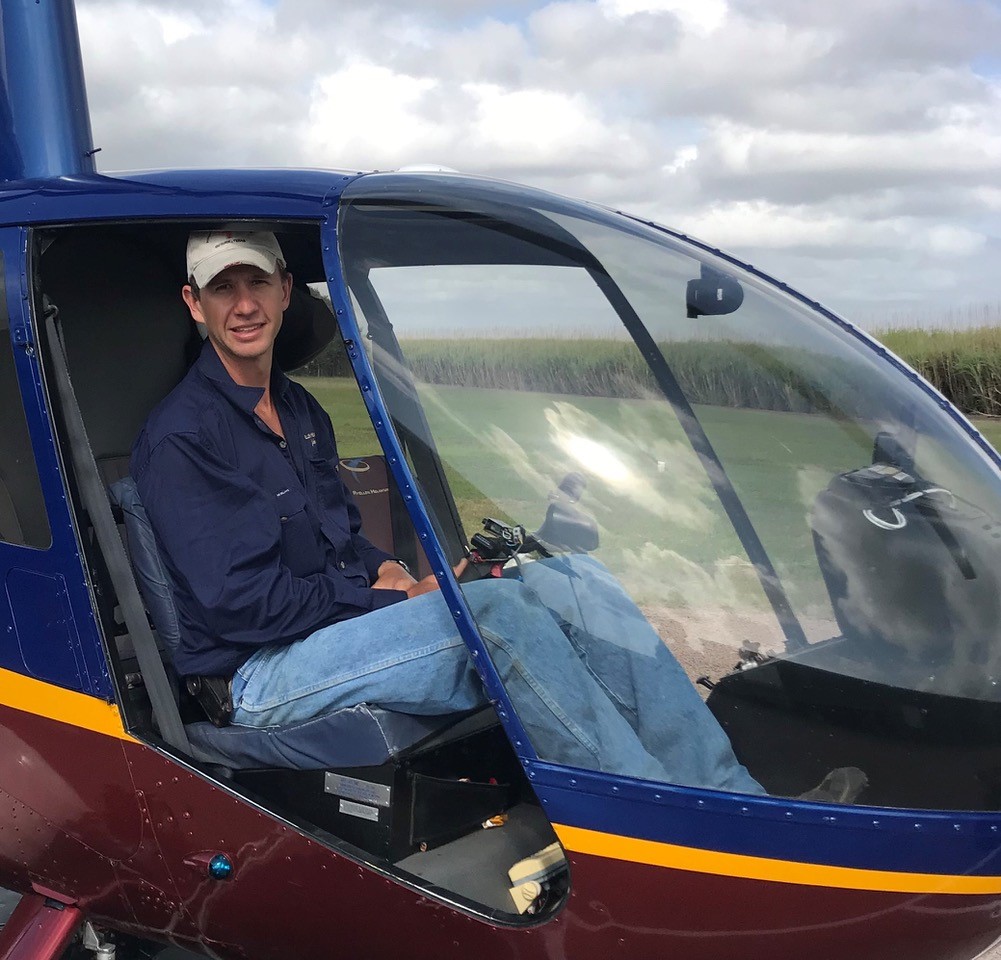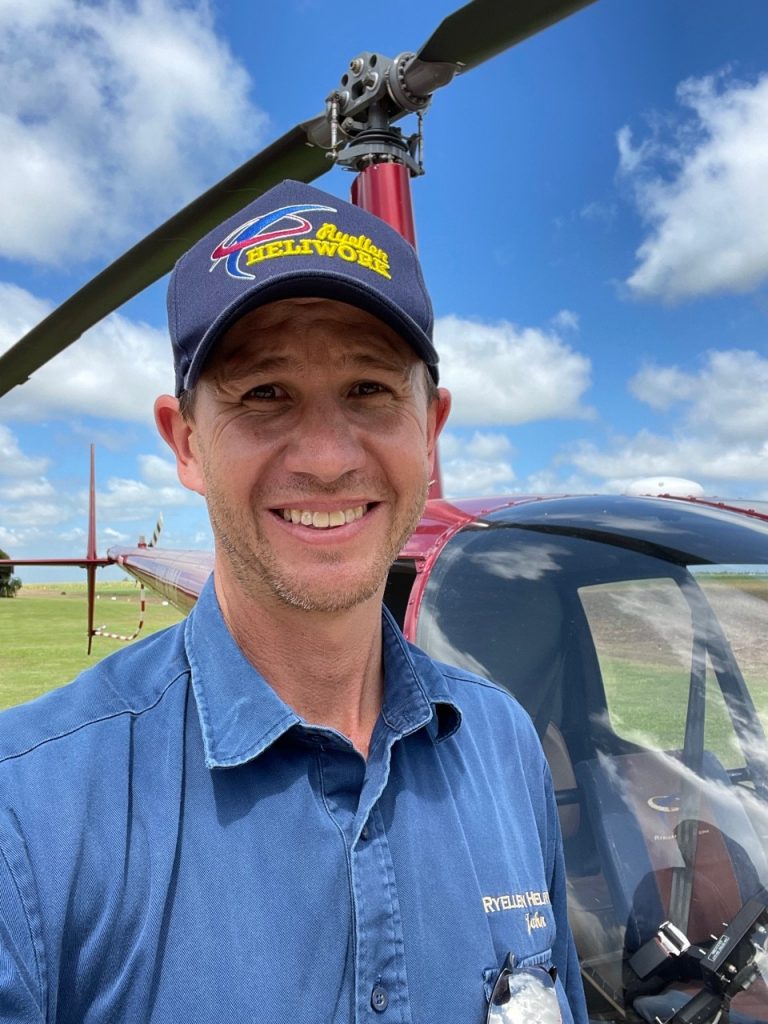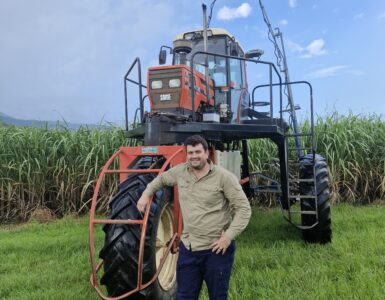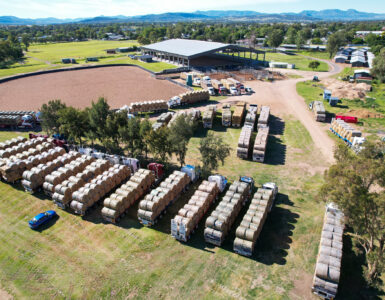For Queensland Helicopter pilot John Nicholas, it was always going to be a career in the air – just not straight out of school.
And getting that life experience on the ground first, he believes, makes all the difference, “a chopper is a tool to do a job, and if you don’t know how to muster or spray or whatever on the ground first, you will struggle to do it in the air,” John says.
John has worked extensively across some of the most remote parts of WA, NT and QLD flying Bell Jetrangers, Robinson R22’s and R44s since 2011.

Supplied: John Nicholas
After six years in the Northern Territory he returned to Queensland and for the past four years has been working for Ryellen Heliwork. He’s based in Ayr, about an hour (driving) south of Townsville and the epicenter of the Burdekin’s highly productive sugar, mango and melon farming district.
There are also plenty of cattle farms in the region, so much of their work is crop dusting, aerial spraying, seeding, or mustering with a bit of feral animal control and photography work on the side.
Agriculture is the dirty, real side of aviation. We don’t get the glamour jobs like the tourism guys do, but it’s always interesting, always different, and always an adventure.
A life-long passion turned into a career
From the very first time he went up in a chopper at age eight, John has loved flying, and even though the work can get (in his words), ‘monotonous sometimes,” he still gets a charge of excitement every time he steps out onto the tarmac.
“From the moment I sit in the chopper while it’s warming up – I mentally switch off from everything else that’s happening and just focus on my job. Then you’re up in the air, and the view is different every day – that’s the best part about flying choppers! “
Flying conditions, especially in summer, are best in the coolest parts of the day, so John and his colleagues are usually up in the air by dawn. “We get to see the sunrise every day and watch the landscape changing before our eyes; crops coming up, coming off, wetlands flooding then becoming dry again, and the cycle goes on. It’s pretty cool.”
Aviation has always been in John’s family. His grandfather, a WWII veteran, and pilot, had a fixed-wing plane at their family cattle property northwest of Townsville, and John spent many hours with him in the passenger seat, always instinctively assuming that flying would be a part of his adult life too.
There was one problem, though. Airsickness.
“I get pretty crook in planes but never choppers. In a chopper, I am in control; I can anticipate the movement that’s coming and can brace myself; nothing is a shock to me.”
So fixed-wing planes were out and John turned his sites to ‘rotary-wing craft’ aka choppers.
But not straight away.
After school, John studied agricultural science at The University of Queensland and then went straight into the work force as an extension office in the beef industry based out of Charters Towers for around six years, “until I just couldn’t sit in an office for one more day.”
With his background in agriculture and childhood love of flying, John decided to pursue a career in agricultural aviation and hasn’t looked back.
It’s over a decade since he started flying, and John is still very passionate about his job. And this, he believes, has kept him moving ever forward in his career.
Whatever field you want to work in, you’ve just got to be really passionate about it. You don’t have to be the best at school; you just need to really want the work and be dedicated to doing the best job you can. Every day.
“Take your time”
There are a few reasons why John recommends aspiring chopper pilots take their time deciding on this career. Firstly, it’s about the cost, “getting and keeping your pilot’s license is very expensive, and that can be prohibitive for school leavers.”
He also believes that you need some life experience on the ground before working above it in agriculture. “You need to know how the crops grow, to understand how a mob of cattle behaves, and just to get that foundational knowledge around the kind of agriculture you’re going to work in – from the ground up.”

Supplied: John Nicholas
Another character attribute John believes a good pilot needs is a cool, calm head, “you need to be an octopus to fly a chopper – you have 5-6 control inputs at once, fatigue can really get to you, and you have to always be managing your and your aircraft’s limitations. Anyone can learn to fly, but the people who make a good career out of it are the ones who take their time and keep their cool in any situation.”
Life experience, John says, is vital, “I didn’t start my career as a chopper pilot till I was 27 and had done lots of different things first.” This maturity and experience have, John believes, helped him in the air and dealing with clients, staying on top of maintenance and all the many ‘on the ground’ jobs that are also part of the gig.
So let’s re-cap. For young people wanting to work in agricultural aviation, what are the steps John believes they should take?
Firstly, “go and work on the ground first, settle down a bit and once you have a reputation as a good stockman on the ground first, then get your license, and you should have no problem. We always need good pilots for this work, so the job will be there when you’re ready for it.”
Secondly, John suggests getting as much experience and making as many connections as you can, “get some good recommendations, do work experience, show people that you are trustworthy and hardworking. They’ll remember that when you’re ready to fly for them”.
And thirdly, make sure this really is what you want to do! “Just to get the basic license to fly is a minimum of $85k, so you’ve really got to want it.”
John’s Fast Five
- An app on your phone you couldn’t live without? NAIPS – National Aeronautical Information Processing System – have to stay across the weather!
- Your most used tool/piece of equipment? Flight Helmet – Every time no question never leave the ground without it.
- The first thing you do when you get back from a big flying job? (Eg – coffee/breather) Stow the machine safely and securely – make sure its fueled, oiled and cleaned ready for the next sortie – then coffee and phone calls.
- Your ultimate flying playlist (if you do listen to music while flying? If not, road trip playlist?!) I tend not to listen to music – usually the radio if at all usually I will try to catch the ABC AM program at 8am and then the Country Hour.
- Best helicopter scene in a movie? Could you name the movie?! They usually get it all wrong there has been plenty of ones where I think I wish that a helicopter could do that! Anyone wanting to learn to fly – Don’t believe everything you see on TV! Probably Apocalypse Now had the highest number at one time!






































Add comment